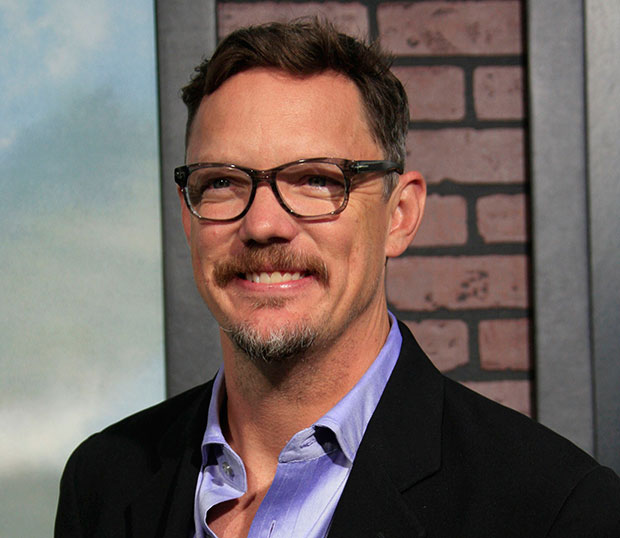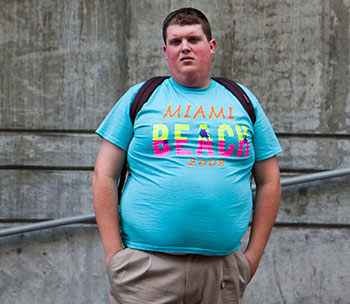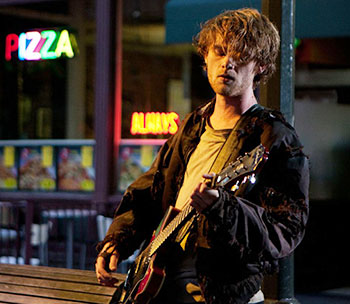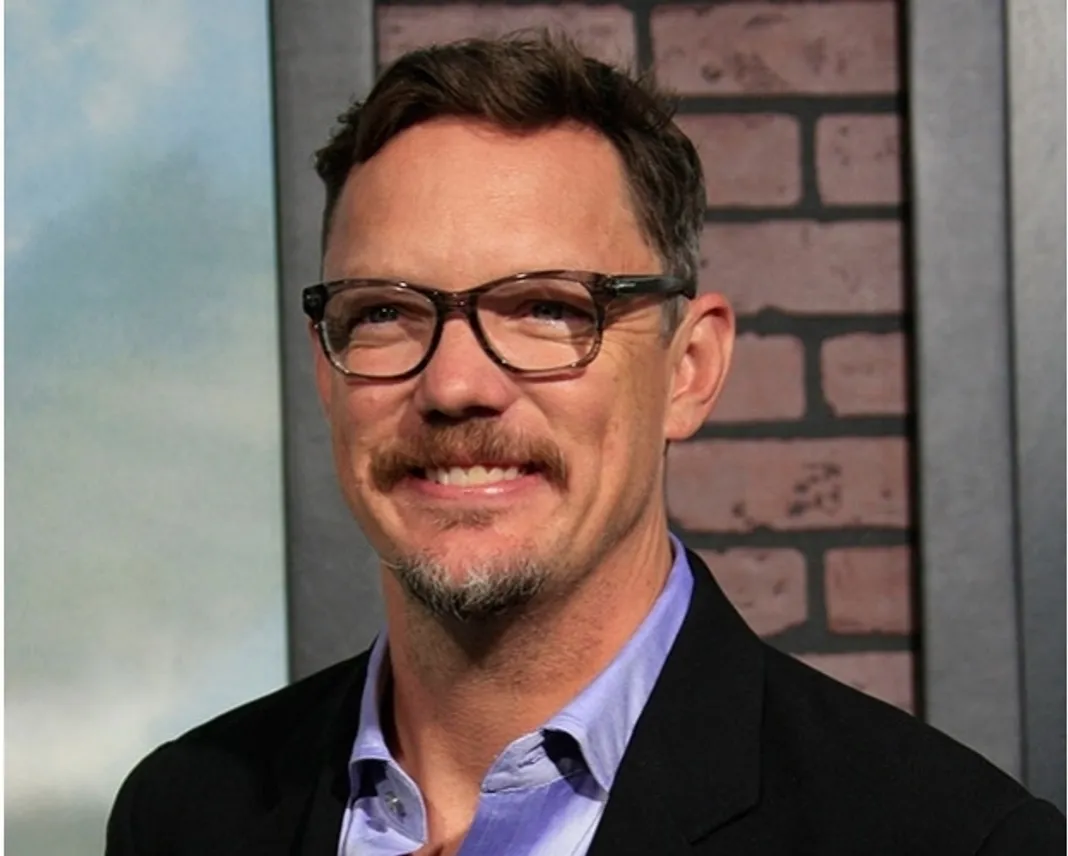 When I caught Matthew Lillard halfway through a lunch of rice and beans, jokingly cursing his publicist for the timing of our interview, I knew he’d have some interesting things to say about his directorial debut, Fat Kid Rules the World. An actor known best for his roles in Scream and She’s All That, Lillard affirms that neither onscreen performing or behind-the-scenes creating have been easy endeavors for him — as he states, “It’s not like anyone has ever written a part for Matthew Lillard,” although many would sing the praises of his turns in both teen movie staples. But despite this, the budding filmmaker has big dreams. Like, explosion big.
When I caught Matthew Lillard halfway through a lunch of rice and beans, jokingly cursing his publicist for the timing of our interview, I knew he’d have some interesting things to say about his directorial debut, Fat Kid Rules the World. An actor known best for his roles in Scream and She’s All That, Lillard affirms that neither onscreen performing or behind-the-scenes creating have been easy endeavors for him — as he states, “It’s not like anyone has ever written a part for Matthew Lillard,” although many would sing the praises of his turns in both teen movie staples. But despite this, the budding filmmaker has big dreams. Like, explosion big.
This isn’t exactly a thought that comes to mind upon watching Fat Kid Rules the World, an intimate, poignant, and funny story about a teenager’s journey to identify and love himself via the avenue of punk rock music. Lillard loves and appreciates the message of this movie, which he adapted from a novel by author KL Going. But Lillard affirms that he’s interested in expanding his scope beyond smaller pictures like this one and into the realm of the likes of superhero adventures, specifically citing a few Marvel properties he wouldn’t mind tackling.
Lillard and I began chatting about the story behind Fat Kid Rules the World, what drew him to the project, and the creative decisions that produced a heartwarming and often laugh-out-loud piece of film:
Matthew Lillard: I have to say, it’s been a pretty amazing week. We haven’t stopped. Mostly because people really like the movie and have been responding to the movie. That’s all you can hope for, really.
Can you tell a little bit about what the response has been like?
ML: I don’t know if it’s whether people don’t expect it from me, or they don’t know what they’re going to get when they’re getting into the movie. But we’ve screened it a bunch of times, and we’ve had reviewers see it all week. It’s just kind of an astronomical response. You deliver a movie that has heart — look, I think it has heart — and is telling an emotional story, and doing it with humor. When you get a good story going, and people find it, it’s fun.
I think it’s interesting that you say people don’t know what to expect from you. This is your first feature. A lot of people know you as an actor, from your Scream days. What exactly was the motivation to pick this as your breakout into directing?
ML: Well, I found it. I did the book on tape. I had never done a book on tape in my life, I haven’t done one since. As I was reading the book, I was blown away by the storytelling. I was moved by his journey. I saw an opportunity to tell a story that hummed inside of me. At some points, I had tears running down my face reading the book on tape. That doesn’t happen very often. I saw a potential to make a movie out of it. I begged the writer to let me direct it, and she said yes. It took ten years to get it done, but we finally got it done. Directing has been in my DNA for years, but I finally got an opportunity to express it. The combination of finding money and finding material and finding someone who will say yes to you is tough as a filmmaker.
This might be a difficult thing to articulate, but is there any specific reason the story spoke to you so strongly?
ML: Sure. Not hard to articulate at all. My life was difficult. I was an overweight kid. I had come from overweight parents. I had a severe learning disability. I wore glasses my whole life. I had braces in high school and junior high school. I was a guy on the outside looking in. I was a lost kid. The movie is called Fat Kid Rules the World, but it’s not just about fat kids. It’s about kids who don’t have a place in the world. It’s the story of the 95 percent of the world that doesn’t feel like they fit in in high school. I was one of those kids. I found drama, I found acting. Acting shifted my paradigm, it changed my life, it defined who I was. Troy in the movie finds punk rock music, and that changes his life. The similarities between me and that kid were palpable. I think that’s why the story lived in me. 
With a similar personal background, I had the same reaction to the movie. So I get where you’re coming from.
ML: Good! If you can combine art and the idea that movies can help people transcend and change and grow, and you can do that in a way that’s entertaining and doesn’t bash you on the head, that’s a great combination.
I think a lot of the progress that Troy made came just from identifying himself with something. Do you think it needed to be punk rock for Troy?
ML: No, of course not. It could have been anything. It could have been art, it could have been acting, it could have been zoology. Pets, animals, friends, chess, anything. And that’s the truth of any kid. Those kids who are lost and who need this movie, the idea isn’t that they’ll go find punk rock music, but that they’ll find something that means something to them. I have three kids. One of them finds books, one of them finds sports, and one of them finds Barbie dolls. It doesn’t matter as long as you find something that you love… by the way, not one of my kids has ever owned a Barbie doll. I don’t know why I just said ‘Barbie dolls.’ That’s the weirdest thing I’ve said in 30 straight hours of interviews. People are going to define themselves — whether it’s tattoos on their arms of crazy purple hair — they’re going to find and define themselves any way that they get inspired to do so.
Is that a theme you hope to continue in your projects?
ML: No, not really. I liked telling this story, and I like being an independent filmmaker. But my goal is to make big movies. I want to keep finding entertainment. If I can find stuff that has weight and can live in people, that’d be great. But I would like to make movies that end with explosions at some point. Those are fun too. You know what I mean? I’ve kind of explored this. I never have to talk about this idea again.
You delivered it pretty effectively.
ML: There’s a movie that we’re circling right now. It’s a book. I can’t really talk about it, but it’s about how far parents will go to protect their kids. There are all kinds of themes and art that I’d love to explore.
Lillard went into detail on bringing the film to life — a process that included reshaping some of Going’s characters and elements for the screen.
ML: We definitely changed elements in the adaptation. We added cinematic elements. We added Lily Simmons’ character. There is no girl throughout the book. But we felt that we wanted to add the allure of a woman. We never wanted to answer that question. We never wanted to be like, ‘Hey, he gets the girl in the end!’ That was never the case. It was very important to me to not end the movie in a way like, ‘Everything’s awesome!’ Because I just don’t think that’s honest. What else did we add? It was set in New York originally, which I think added to the idea of being surrounded by people, and always being conscious of people staring at him. So we lost that element because it was put in Seattle. It was more of his journey than his fear that other people around him were mocking him. There are a lot of translations. He has newspaper headlines throughout the book that are a way to look into his life. We don’t really have those. We have those little flash-outs. The fantasy sequences. So we take what she had in a literary device and we translate it to a cinematic device.
That’s a unique tool that I think we’re seeing come up a little more in a few different types of movies. The showing of the inside of the character’s mind in a scene, and then you cut away and you realize that it’s not real life. It’s kind of a risky tool in certain movies — I like the way it was done in Fat Kid Rules the World, so I’m interested in knowing how you handled that in a way that didn’t seem like you were just jumping into his mind haphazardly or veering from the story. Were there more? Were there times when you thought, ‘Well, maybe we shouldn’t do it now?’
We definitely used it more in the first third of the movie to get into his mind. A film is motivated by story — you have to be progressing the story, you can’t just be adding things for the sake of adding them. In fact, there’s a sequence in the movie where I play a part as the guidance counselor, and it becomes a huge fantasy sequence. It didn’t serve the movie. It didn’t move the movie forward. So at the end of the day, we cut it. I think for us, those elements had to land, or they were gone. They had to show us something we didn’t know, or they had to leave. If you can hold that litmus test up to the whole script, you get a movie that has a real forward momentum. Those elements came and went all the way through the writing process, as you can imagine. ‘What can we do here? Do we need to make it funnier?’ You’re adding little bits. You have to be judicious with what you end up using. You have to make sure it serves not only the character, but the movie.
ML: I was there, but I disappeared.
 My favorite part of this movie was the relationship Troy (Jacob Wysocki) has with his father. In a lot of these movies, you have a father like that, and he’s not really depicted as a sympathetic character. But then at the end, he’s kind of redeemed. But throughout, you see that Troy’s father is a good guy who just has trouble connecting with his son. I’m interested in knowing about your mentality behind crafting that character and everything that went into building their relationship.
My favorite part of this movie was the relationship Troy (Jacob Wysocki) has with his father. In a lot of these movies, you have a father like that, and he’s not really depicted as a sympathetic character. But then at the end, he’s kind of redeemed. But throughout, you see that Troy’s father is a good guy who just has trouble connecting with his son. I’m interested in knowing about your mentality behind crafting that character and everything that went into building their relationship.
ML: I think it’s one of the great relationships in the book. What he says and what he does are two different things. ‘You’re unacceptably dirty.’ He’s a different guy that then he goes out and buys a drum set and sets it up for his son. I love that about the character. He’s a three-dimensional character. He’s a guy trying to do his best. That was my pitch to Hollywood, trying to find someone to play the part. I promise you, he gets to do everything. It’s a great part. And finding Billy Campbell was a great part of that, because he’s just simple and straightforward. In terms of shaping that character and the tone of that character, that was one of the great things for me. As a filmmaker, I like to take things that you expect to happen and kind of turn it on his ear.
In one of the great scenes of the movie — the puke scene — you’re laughing, ‘Oh my God, what the hell is that?’ And Marcus has a great tagline: ‘How’s that for punk rock?’ And everyone in the crowd is laughing. And the next sequence you have is the dad disassembling the drum kit. And he goes on this huge emotional journey that ends at the bottom of the pool and smashing donuts against the wall. I like turning things on their ear a little — I think that Alexander Payne is a master of that — and kind of taking the expectation and the intelligence of the audience and using that against them a little in terms of setting up that character. Setting up the father in which to be a jerk, and ends up being just a guy trying to do the best he can in the moment.
Beyond our discussion of this film, however, we began talking about the possible future for Lillard’s career as a director. As happy as he is with the movie, he was underwhelmed with the industrial response to it. As such, Lillard is adamant about exploring bigger, more sensational projects, for which he also has a true passion — one he owes, as many of us do, to Star Wars.
ML: When this movie came out, I thought, ‘Oh great, here we go! Hollywood’s gonna find it. We won the audience award, we have great reviews. Here I go. I’m gonna get offers. And go! Cricket, cricket, cricket. Nothing’s really happened. So we’re kind of back to the drawing board … It’s never been easy for me. It’s not like anyone has ever written a part for Matthew Lillard. So, I don’t know why I expected it to be easy as a director. I had five, six months of me waiting for Hollywood to pay attention. And they haven’t paid attention. I have to figure out something to do next. Find a new story to tell. We just started that process.
When we started talking, you did say that there has been a lot of positivity.
ML: In the past 48 hours, it’s been awesome. The blogosphere, the reviewers, the audience – that awareness and those things are important to me as a man, important to me as a filmmaker. But in terms of Hollywood, and the machine, and the industry, nobody really gives two sh**s in Hollywood. The truth is, I have to translate the passions that people have for the movie into some kind of success so that Hollywood pays attention. If they pay attention, then things can change in terms of my personal direction. But for the movie, it has been a great 48 hours for the movie.
Is Hollywood’s attitude your chief motivation in exploring larger movies? Or is it that you have a particular personal interest in those kind of stories?
I like big movies. I like big Hollywood movies … Joss Whedon’s Avengers was awesome. Set up something in the first act, pay it off in the third act. Great story arc. Great performances. Cool special effects. I had a blast watching it. I like telling those stories. I’d love to be able to tell that story. I’d love to make a great Iron Man. I would like to make a great action movie that people love, that has great performances and great story and great characters. You can do things on a big scale. That’s fun. I grew up in a world of—the single most defining force in my life was Star Wars. I played with action figures until I was well into my high school years. My imagination that I generated through that process helped define my whole life. If I can make a movie like that, it’d be awesome. Nothing would make me happier. I’d make a good one! Not a sh***y one. I don’t want to go off and make a sh***y one.
[Photo Credit: Starbux/WENN.com, Outsider Pictures]
More:
Colin Farrell Talks ‘Seven Psychopaths’ and Exposing Movie Violence
Hamptons Film Fest: Revelatory ‘Call Me Kuchu’ Explores Violent Persecution of Uganda’s LGBTs
From Our Partners:
 Noo!! Most Tear-Jerking Pet Deaths in Movies
Noo!! Most Tear-Jerking Pet Deaths in Movies



